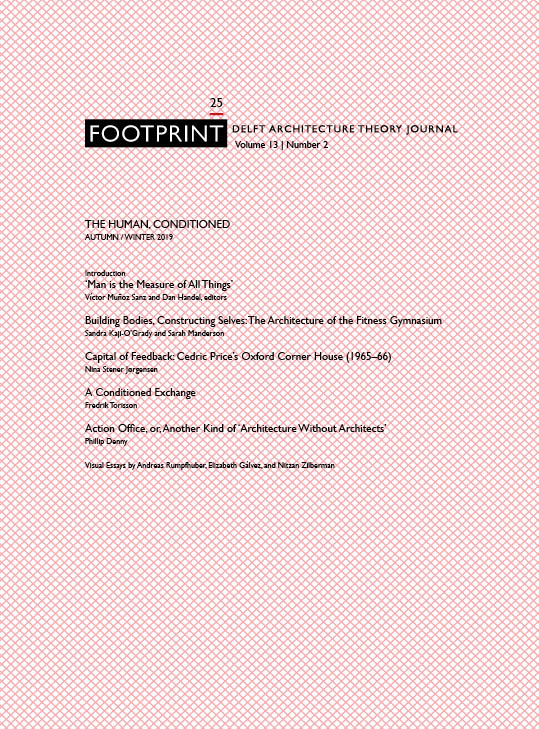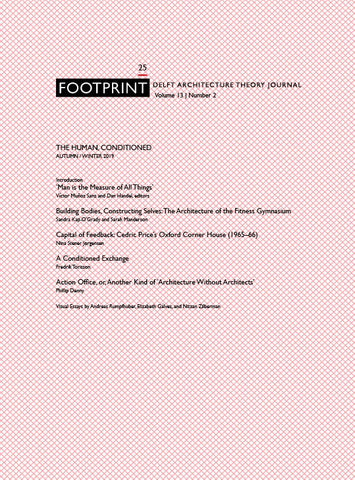Your cart is currently empty!
Footprint 25 The Human, Conditioned
++++++
+++Dan Handel, Victor Muñoz Sanz [eds.]+++
978-94-92852-18-2
Ania Molenda
138
19 x 25.7 cm / 7.48 x 10.12 inches
paperback
Release date: Autumn / Winter 2019
English
Copy editor: Heleen Schröder
Published in cooperation with Architecture Theory Chair (TU Delft) and Stichting Footprint: http://footprint.tudelft.nl/
For a subscription: Bruil & Van de Staaij
+++
The anthropocentrism of architecture has seldom been challenged. However, some architectures function with a set of values emanating from the industrial economy, creating spaces to which human bodies must adapt and survive.
The radical conditioning of humans by the built environment reaches over geographies, times and scales. These spaces could provide architecture with the opportunity to reimagine the relationship between humans and ‘technical objects’, and reconsider humanism.
This issue seeks to highlight spaces of radical conditioning, in which humans have to operate according to the logic of industrial economy and technology, through an understanding of the machine and its rise in contemporary societal and architectural instances of such spaces. Contributions challenge ideas about technology, economy, and the built environment, while uncovering the rationale, values and motivations behind their conception and functioning, and the stories of their human users. To what extent can deconstructing technological determinism in architecture reveal new forms of human/machine agency?
With contributions by the editors Victor Muñoz Sanz and Dan Handel, and Sandra Kaji-O-Grady, Sarah Manderson, Nina Stener Jørgenson, Fedrik Torisson, Philip Denny, and visual essays by Andreas Rumpfhuber, Elizabeth Gálvez and Nitzan Ziberman.
€25.00
Footprint 25 The Human, Conditioned
€25.00
Architectuur / Bookazines / serie / Theorie / Stedenbouw
978-94-92852-18-2
Ania Molenda
138
19 x 25.7 cm / 7.48 x 10.12 inches
paperback
Release date: Autumn / Winter 2019
English
Copy editor: Heleen Schröder
Published in cooperation with Architecture Theory Chair (TU Delft) and Stichting Footprint: http://footprint.tudelft.nl/
For a subscription: Bruil & Van de Staaij
The anthropocentrism of architecture has seldom been challenged. However, some architectures function with a set of values emanating from the industrial economy, creating spaces to which human bodies must adapt and survive.
The radical conditioning of humans by the built environment reaches over geographies, times and scales. These spaces could provide architecture with the opportunity to reimagine the relationship between humans and ‘technical objects’, and reconsider humanism.
This issue seeks to highlight spaces of radical conditioning, in which humans have to operate according to the logic of industrial economy and technology, through an understanding of the machine and its rise in contemporary societal and architectural instances of such spaces. Contributions challenge ideas about technology, economy, and the built environment, while uncovering the rationale, values and motivations behind their conception and functioning, and the stories of their human users. To what extent can deconstructing technological determinism in architecture reveal new forms of human/machine agency?
With contributions by the editors Victor Muñoz Sanz and Dan Handel, and Sandra Kaji-O-Grady, Sarah Manderson, Nina Stener Jørgenson, Fedrik Torisson, Philip Denny, and visual essays by Andreas Rumpfhuber, Elizabeth Gálvez and Nitzan Ziberman.



